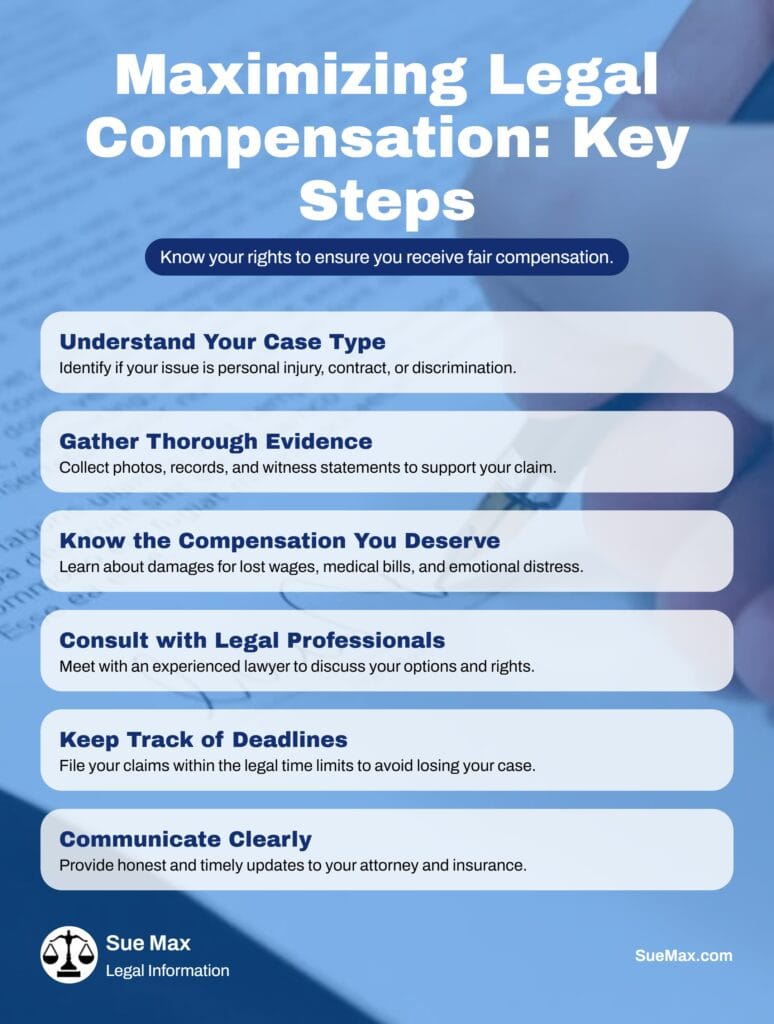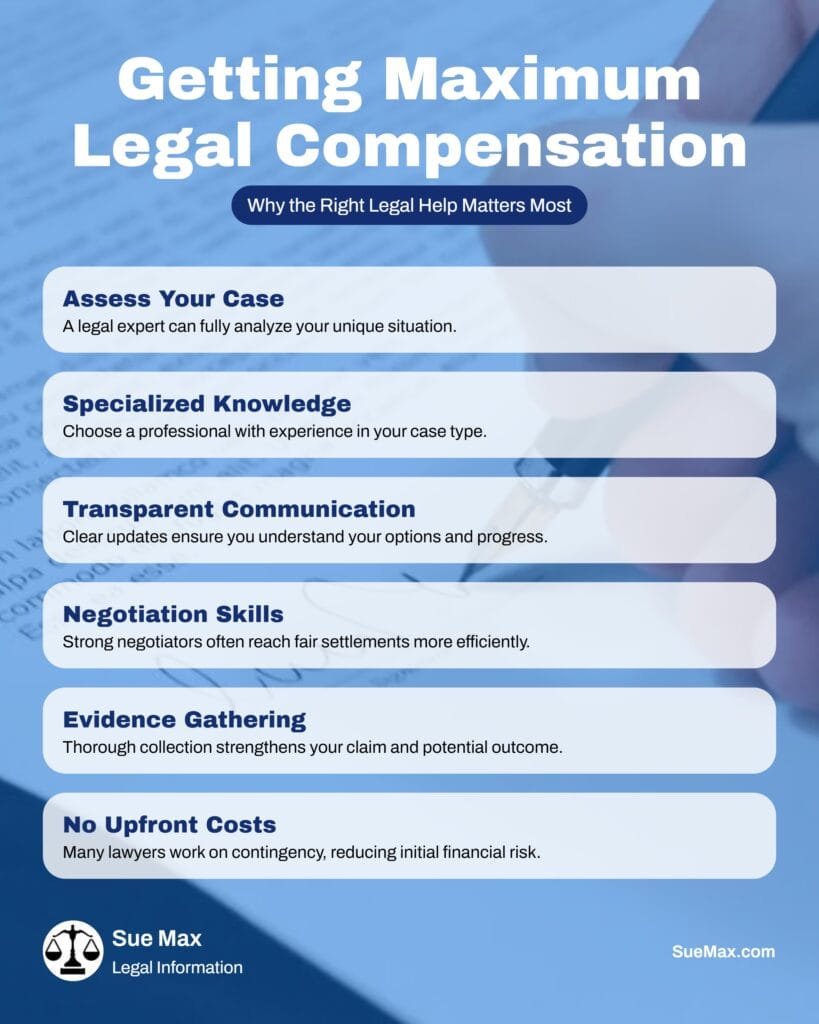When something bad happens, like an accident you didn’t see coming or losing your job, one of the first things that could come to mind is, “How am I going to pay for all this?” It’s very normal! Finding your way through the maze of compensation claims might be as hard as finding your way out of a cornfield with your eyes closed. But don’t worry! You can earn the most money possible and make sure you get what you really deserve with some smart planning and a little bit of willpower.
Top Takeaways and Key Concepts
Know your rights before acting. Research state-specific laws so you can claim all benefits you’re entitled to.
Document every detail immediately. Collect photos, witness statements, and medical records to strengthen your claim.
Hire a qualified specialist. Choose a personal injury lawyer with proven experience and clear communication.
Negotiate with patience and proof. Use evidence and calm persistence to push for a fair, full settlement.
Track all deadlines meticulously. Use digital reminders and organized folders to avoid missing critical filing dates.
Summary of This Article
This article provides a humorous yet practical roadmap for maximizing compensation after an accident or injury. It emphasizes understanding your legal rights as the foundation for success, supported by solid evidence collection and expert legal guidance. Readers are encouraged to organize documentation carefully, choose the right professionals, and approach negotiations strategically with patience and confidence. The piece also stresses the importance of meeting every deadline, using calendars and reminders to prevent costly oversights. Overall, it empowers readers to take charge of their claims with knowledge, preparation, and persistence—ensuring they get the compensation they truly deserve.
Understanding Your Rights

Please Note: This post may contain affiliate links. If you click one of them, we may receive a commission at no extra cost to you. As an Amazon Associate, I earn from qualifying purchases.
👓 When it comes to maximizing legal compensation, did you know that in some states, you can sue someone for emotional distress caused by their bad karaoke performance? Yes, that’s right! If Uncle Bob’s rendition of “I Will Survive” was so traumatic that it left lasting scars on your psyche, you might just have a case! 👓
“Justice is the constant and perpetual will to render to everyone his due.” — Justinian I
Knowing your rights is the most important thing. Honestly, knowing what you’re entitled to is like having a treasure map on this journey. You have certain rights that protect you depending on your scenario, whether it’s an accident claim, a job conflict, or damage to your property. So, let’s take it apart!
If someone else’s carelessness caused you to get hurt (like that slick floor at the grocery store), you can get money for medical bills, missed wages, pain and suffering, and more. If you were wrongfully fired from your job, on the other hand, there are laws that can help you get your lost pay back and maybe even get your job back. Knowing these rights gives you authority as a claimant and helps you speak up for yourself.
Rights and Giggles: Know What You’ve Got
– The Ice Cream Defense: In some places, if you slip on a spilled ice cream cone, you might be able to sue the ice cream company! Just imagine telling your friends you got “scooped” in court.
– Injuries from Unusual Objects: People have actually filed claims for injuries caused by bizarre items like flying golf balls or rogue shopping carts. So next time you’re at the store, watch out—those carts can be sneaky!
– The 3-Year Rule: Most personal injury claims have a deadline of three years to file. That’s enough time to binge-watch an entire series on Netflix… twice! But don’t wait too long or you’ll lose your chance to cash in on that couch potato status.
Now things become interesting: not everyone knows what their rights are! It’s kind of shocking, to be honest. Some people might assume they have to take whatever insurance companies offer them, like it’s the final piece of pizza at a party and they don’t want to be rude. That’s like thinking that cereal that’s gotten wet is a fancy breakfast. Who wants to eat mushy flakes first thing in the morning? You wouldn’t settle for a dinner that didn’t taste good, so you shouldn’t settle for pay that isn’t fair.
It can seem like trying to read an old language when you try to understand your rights, but it doesn’t have to be that hard. To begin with, each state has its own rules about personal injury claims, workers’ compensation, and even tenant rights. This means that what works in one place could not function in another. So, whether you get hurt at work or in a car accident, looking into local legislation can help you find hidden jewels, like benefits you didn’t even know you had!

Think of this procedure as putting on armor of knowledge before going into war. The more you know about what you can get, like medical bills, lost income, pain and suffering, the more prepared you’ll be when you talk to insurance companies or other people who are against you. And let me tell you, those talks may be like attempting to negotiate at a flea market when the seller says their ancient lamp is worth twice as much as its weight in gold!
A lot of people think that all they have to do is file a claim or talk to an insurance adjuster. Spoiler alert: that’s just the start! Insurance companies are known for making low initial offers—it’s almost like their favorite thing to do! They could expect you’ll take whatever few bits they give you and be done with it. But do you know your rights and what a fair amount of money looks like based on similar situations in your area? You’ll be ready to fight back and get what’s properly yours.
So, how do you learn in a way that works? To begin, look for online resources that are unique to your area and deal with personal injury legislation or workers’ rights. There are a lot of trustworthy websites that give away free material that makes hard-to-understand legal terms easier to understand. I could even understand them! You might also want to get in touch with local advocacy groups or legal aid groups. They regularly hold workshops or informational sessions just for those who are going through this.
Being aware of your rights is more than just knowing them; it gives you power. You won’t be nervous when it’s time to negotiate or even go to court because you’ve done your homework. Believe me, it will make a huge difference when you stand up for what you really deserve!
Gathering Evidence Like a True Crime Detective

👓 In some bizarre legal cases, people have successfully claimed compensation for injuries caused by overly enthusiastic pets. For example, a man once sued after being knocked over by a Great Dane that was just trying to give him a friendly lick! So remember, when gathering evidence, don’t forget to document the furry witnesses! 👓
“Truth is stranger than fiction, but it is because Fiction is obliged to stick to possibilities; Truth isn’t.” — Mark Twain
It’s time to put on your detective hat and start gathering evidence after you know what your rights are. This phase is like putting together your superhero toolkit, because every piece of information is important! Medical records, witness testimony, and pictures of injuries or damage are all examples of documentation.
Imagine going into discussions with strong proof; it’s like going to a pie-eating contest with a real pie instead of empty hands! Start by writing down all you know about your case in great detail. This entails writing down dates, times, and conversations with witnesses, including those times when someone attempts to downplay what happened (you know who I’m talking about).
Evidence Hunting: Channel Your Inner Sherlock
– The Power of Photos: Taking pictures of an accident scene can be like capturing evidence for your own personal crime show. Just remember, the more angles you cover, the less chance someone will claim that your dog actually caused the chaos!
– Witnesses are Gold: Having a witness is like finding a hidden treasure map! They can help back up your story. Just make sure they’re not your buddy who thinks he’s a comedian—his version might involve aliens and time travel.
– Document Everything: Keeping records is key! Jot down details right after an incident, because if you wait too long, your memory might start mixing in lunch orders and random cat videos instead of facts.
Getting all the right papers is an important step on the road to getting the most money possible. You could say that police reports, hospital bills, and other papers relating to your case are like the breadcrumbs that lead you to the treasure of what you deserve. Each piece of evidence tells a story and makes your argument stronger than a Lego fortress, but you don’t have to worry about tripping on them barefoot!
If you want to impress folks at parties with your organizational talents, you may make a neat folder (either physical or digital) and call it “My Amazing Evidence Collection.” Just picture yourself coming into a party and casually saying that you’ve carefully sorted all of your papers. People will think you’re some kind of legal superhero! “Oh, this? “It’s just my evidence folder,” you’ll remark casually, but you’ll love the looks of envy.

Let’s talk about the many types of documents you need to collect. First of all, police records are quite helpful when it comes to showing who was at fault in an accident. They give an official description of what happened and may contain witness statements that support your assertions. Then there are the medical bills, which list every bandage, X-ray, or doctor’s visit that came from your accident. You might even think back to that time you had to go to the clinic again. It wasn’t fun, but it was important to express how much this circumstance affected your life.
In addition to those important things, think about getting pictures or films that show your injuries or the harm that happened. Images may be quite strong! A picture is worth a thousand words, and in this case, it may show the anguish and suffering you’ve been through better than any written description ever could. So go ahead and take pictures! Just make sure they aren’t too gory, or you’ll clear the room at your next party.
When you put these papers together, it’s important to be organized. Seriously, who wants to look through a messy stack of documents when they could have everything organized? Keeping things organized now will help you deal with stress later. For example, you could use colorful folders for paper copies or make separate files on your computer for different types of documents, such “Medical Bills” and “Police Reports.” Plus, when it’s time to negotiate or go to court, you’ll look like you have everything under control, which is a nice feeling!
And here’s another piece of advice: don’t forget to write down any discussions you have with anyone who is working on your case, like lawyers, physicians, insurance adjusters, and so on. Writing down notes quickly after a conversation makes guarantee that nothing is lost, since memories fade faster than ice cream on a hot day.
That’s all there is to it! You’re setting yourself up for success by gathering the right documents and organizing them in a fun way (like calling them “My Amazing Evidence Collection”). Who would have thought that dealing with the law could be both useful and fashionable? Now go out and grab those gems; every little bit helps you get what you really deserve!
Hiring the Right Professionals

👓 In a strange twist of fate, a lawyer once won a case by using the opposing party’s own social media posts against them. They had bragged online about their “amazing recovery” from an injury that they were claiming was debilitating! So, remember: what you post on the internet can come back to haunt you—even in court! 👓
“Lawyers are like beavers: They get in the mainstream and dam it up.” — John D. Voelker
It can be scary to handle compensation claims on your own, like having to swim across shark-infested waters without a floatie. That’s why it might be really helpful to hire professionals that know a lot about these things. A qualified lawyer will help you through every step and make sure that nothing is missed.
But how do you pick the proper one? First, find someone who has worked on situations like yours before, not simply anyone in a suit who thinks they know everything! In this digital age, word-of-mouth is still the best way to find out about things. Read reviews online or ask friends for suggestions.
Finding Your Legal Dream Team
– Specialization Matters: Just like you wouldn’t ask a dentist to perform brain surgery, hiring a lawyer who specializes in personal injury is key. They know the ins and outs of the law better than your Uncle Larry knows how to fix his car with duct tape!
– Experience Counts: When looking for a lawyer, think of it like choosing a pizza place. You want one with lots of good reviews and years in the game—not the new shop that just opened last week and only offers toppings like “mystery meat.”
– Consultation Perks: Many lawyers offer free consultations! This is like getting a free sample at an ice cream shop. You can taste test their skills without committing—just don’t ask them about your case while they’re trying to scoop up some rocky road!
A lot of lawyers provide free initial consultations, which is like test-driving a car before you buy it. You wouldn’t want to leave the lot with a piece of junk, would you? So why should your lawyer be any different? This is your chance to check them out and determine whether they are a good fit for you.
When you go to that meeting, consider of it as a chance to really get to know their experience and how they help clients get the most money. Find out how many cases they have won in the past. How do they plan to deal with insurance companies? Have they worked on cases like yours before? These questions are really important since you need someone who knows what they’re doing and can handle the treacherous waters of legal discussions. You need to know what you’re getting into before you agree to it, just like you need to know how many miles per gallon a car gets.
During this meeting, try not to forget about your gut feeling. You shouldn’t feel nervous with the proper lawyer. If you feel like you’ve just eaten a live goldfish while they talk on and on about legal jargon, you might want to think again. You want someone who can explain things simply and make them easy to understand, like how a car engine works without making your head spin!

Please don’t be afraid to bring up any worries or questions throughout our talk. A reputable lawyer will be happy to answer your inquiries and will do so in full. They should be able to explain their approach in simple terms, not in lawyer-speak that sounds like old hieroglyphics instead of beneficial counsel. If they’re using words that seem like spells from Harry Potter instead of real techniques, it could mean that things are about to get bad.
Also, think about how they act. Do they pay attention when you talk? Do they appear like they really care about your case and not simply see it as a way to make money? If you have an attorney that listens carefully, they will probably be able to better advocate for you since they will know what you need and how to help you.
Don’t be afraid to talk about fees during this first meeting! It’s important to know how they charge, whether it’s per the hour or as a percentage of the whole cost, so there are no surprises later on. Believe me, no one likes getting surprise expenses that grow up like weeds in a garden. This talk can help both of you avoid that in the future.
It’s also essential to ask about their resources. Do they have access to experts or investigators who can help make your case stronger? Having extra help can mean the difference between winning a lot of money and going home empty-handed.
Take advantage of that free consultation; it’s not only a duty, it’s a chance! Asking smart questions about an attorney’s experience, communication style, fee structure, and available resources, while also following your gut feelings, will help you identify an attorney who really has your back. Keep in mind that all of this is to acquire the most money possible so you get what you deserve, and maybe even a little extra along the way!
Negotiating Like a Pro

👓 In a bizarre negotiation twist, a man once successfully negotiated a higher settlement by bringing his pet parrot to the meeting. The parrot kept squawking “Pay him more!” at the lawyer, making everyone laugh and lightening the mood—while also reminding them that negotiating can be entertaining! 👓
“Negotiation is not about being right; it’s about getting what you want.” — Unknown
It’s time for one of the most important steps: negotiating! You now have proof and help from legal specialists (play triumphant music). This is the fun phase where you get to use your skills, and yes, it could be scary at first.
Honesty is really important while negotiating, so think of it like playing poker without lying. When you talk to insurance adjusters or the other side, having detailed documentation to back up your claim helps you build credibility. They can’t argue with facts!
Mastering the Art of Negotiation
– The Power of Silence: In negotiations, sometimes saying nothing is more powerful than talking. It’s like when you’re waiting for your friend to decide what toppings they want on pizza—awkward silence can lead to better choices!
– Know Your Worth: Studies show that people who confidently ask for what they want are more likely to get it. Think of it as ordering a giant sundae instead of just a scoop—if you don’t ask, you might end up with just sprinkles!
– Body Language Matters: Over 90% of communication is non-verbal! So, if you’re trying to negotiate a better settlement, remember not to fidget or look at your shoes. Stand tall and look like you just won a game of dodgeball—you’ll feel more confident!
Also, keep in mind that first offers are generally lower than you think since they want you to settle quickly without putting up too much of a fight. Don’t fall for it! Make a counter-offer based on what you know from doing a lot of research on similar cases in your area.
During negotiations, it’s important to be patient. It could take several rounds to reach an agreement, but keep going until both sides agree on something reasonable. Imagine that you are trying to make a cake. You don’t just toss everything into a bowl and hope it turns out flawlessly the first time, do you? Negotiating for pay is a lot like this; it often takes time to put together different parts to reach the best result.
When you start negotiating, especially with insurance companies or people on the other side, it can feel like you’re locked in a game of tug-of-war that never ends. One side pulls one way, and then the other side pulls back even harder. It can be annoying, like waiting for your microwave popcorn to complete popping while trying not to think about how good it will taste. But this is when the power of patience comes in.

I now know that the finest negotiators are those who can keep their calm even when things are progressing slowly. Sometimes it feels like watching paint dry—boring and painful—but every minute you spend negotiating is another chance to make your case and get what you really deserve. Take a deep breath and remember that good things come to those who wait.
Every time you negotiate, you can learn more about what both sides genuinely want or need. The insurance adjuster can make an initial offer that feels more like a smack on the wrist than actual money. Don’t give up or behave quickly, like a kid who is unhappy because they can’t have sweets. Instead, take some time to think about what is being offered. Ask yourself: Can things go better? What reasons against may I make? This thoughtful method lets you plan ahead instead of just reacting with your feelings.
Keep in mind that negotiation isn’t only about the numbers; it’s also about getting to know individuals, especially those who seem like they’re on the other team. When having hard conversations, keeping the channels of communication open can make all the difference. A little politeness can go a long way; after all, no one likes to deal with someone who is usually angry or defensive. If everyone stays cool, you’ll get far better outcomes. It’s like turning down the heat on a pot that’s already simmering.
And because we’re talking about pots that are boiling, let’s talk about persistence! You shouldn’t give up hope just because you don’t achieve an agreement after one round. Sometimes it takes a lot of back-and-forth for both sides to agree on conditions that seem fair and reasonable. Like in chess, you might have to give up a pawn or two before you can make your winning move.
On occasion, taking breaks between negotiation sessions can also help clear minds and allow cooler heads to prevail—kind of like letting dough rest before baking bread so it rises perfectly! These pauses provide time for reflection and strategy adjustments while avoiding hasty decisions made under pressure.
Stay patient throughout this entire process! Each round brings opportunities for growth—not just in terms of financial compensation but also personal development as you learn how to navigate these complex waters with grace and confidence. By keeping your eyes on the prize and refusing to settle until both sides reach something fair, you’re setting yourself up for success—and trust me; nothing tastes sweeter than victory after such hard work!
Keeping Track of Deadlines

👓 In 2019, a lawyer missed a critical filing deadline because he was too busy trying to beat his personal best in a hot dog eating contest. He ended up with a case that could have been worth millions but instead resulted in a very hungry lesson about time management! 👓
“Time is what we want most, but what we use worst.” — William Penn
As we go deeper into this process together, remember that deadlines are more important than ever! If you miss important filing dates, you can lose out on all of your possible compensation, which is a terrible scenario that no one wants to deal with.
So, how can we deal with deadlines in a smart way? Make a timeline that lists all the essential dates for your case, from when the events happened to when you filed your claims and any court appearances you may need to make later on.
Deadline Dash: Staying on Track
– The 24-Hour Rule: Did you know that some people forget deadlines because they think they have more time? It’s like thinking you can eat a whole pizza and still fit into your jeans the next day. Spoiler alert: You can’t!
– Color-Coded Calendars: Using different colors for important dates can help! It’s like making a rainbow in your planner—except instead of rainbows, you get money when you remember to file those claims on time!
– Reminder Apps Are Your Friends: Almost 70% of people forget deadlines without reminders. So, if you set an alarm labeled “Don’t be a procrastinator!” you might just avoid turning into a legal pumpkin at midnight!
Use apps or calendars to set reminders so you don’t forget anything in the middle of all the turmoil of your everyday life (because let’s face it, we all have busy lives!). It’s easy to forget crucial things when you have a lot going on, including work deadlines, family obligations, and that never-ending mound of laundry. It’s not just hard to ride a unicycle and juggle blazing torches; it’s also very dangerous! That’s why having a good system in place can help you avoid problems.
First, let’s speak about how many different apps there are nowadays. There are a lot of tools out there that can help you keep your life in order. The most important thing is to find what works best for you, whether it’s Google Calendar, Todoist, or even good old-fashioned sticky notes (they’re still cute!). I appreciate setting reminders for critical deadlines and meetings since nothing is worse than missing an important occasion, like forgetting your closest friend’s birthday party!

By setting aside time to check in with yourself on how your case is going on a regular basis, you are taking charge of your circumstance instead of having it dominate you. For instance, set reminders to check in with your lawyer after meetings or when you send them documents. These tiny pushes will keep you on track and make sure you always know what’s going on. Who wouldn’t want to have a personal assistant without having to pay for it?
And we shouldn’t forget how useful digital calendars are! They can send you notifications at times that work best for you, right to your phone or email. You know how some individuals can recall every tiny thing? I’m not one of those people, that’s for sure! So, these useful tools help me keep track of my calendar and remind me when it’s time to do something.
Now picture this: You have a major meeting to negotiate next week. You don’t have to rush to get papers together and make talking points at the last minute (which could lead to an embarrassing mistake). Instead, you just look at your calendar reminder and relax, knowing you’re ready! All those panicked worries about forgetting something important go away like fog in the morning sun.
Being organized is more than just remembering dates. It also means keeping accurate documents regarding your case. Making folders, both real and digital, for things like communications with lawyers or evidence you acquired can make everything go much more smoothly. When talks become heated (and they do often), you’ll want to be able to get to whatever information you need right away without having to rummage through stacks of papers like you’re on an archaeological excavation!
Once you set up this orderly method, you might also notice that your stress levels go down! Who would have thought that taking action could be so helpful? A well-organized plan lets you focus only on getting the most money possible, without having to worry about missing details or meetings.
Also, don’t be afraid to add some fun things to your path of organizing! Color-coding activities based on how urgent they are could make ticking them off feel more like a game than a job. This is a fun touch that turns boring tasks into fun challenges! And who doesn’t like checking things off their list? It gives you a strange feeling of success, like winning a small jackpot!
So, keep in mind that by using technology wisely, like reminders and organizational tools, and keeping everything neat and easy to find, you will give yourself more control during this whole process. The journey may be long, but remaining organized will make your travels easier as you go after what is rightfully yours!
In conclusion, your journey is about to begin…
Getting the most money possible takes work, but the rewards are worth the effort along this long and winding path ahead! By properly understanding your rights and accumulating strong evidence with the help of professionals, you can successfully navigate talks that will lead to the outcomes you deserve, which will finally be agreed upon by all parties concerned.
So go ahead and take responsibility now, knowing that YOU have the power to get the proper amount of money back in YOUR pocket where it belongs!
Suggested External Resources
Maximizing Compensation After an Accident
https://www.nolo.com/legal-encyclopedia/maximizing-compensation-after-an-accident-29910.html
Understanding Your Rights When Injured
https://www.findlaw.com/injury/understanding-your-rights-when-injured.html
The Importance of Evidence in Personal Injury Claims
https://www.avvo.com/legal-guides/ugc/the-importance-of-evidence-in-personal-injury-claims
Negotiation Tips for Settling Personal Injury Claims
https://www.injuryclaimcoach.com/negotiate-settlement.html
How Deadlines Affect Your Legal Case
https://www.lawyers.com/legal-info/research/deadlines-affecting-your-case.html
Frequently Asked Questions
What are the first steps to take after an accident or injury?
Start by learning your rights and documenting every detail immediately. Early evidence collection helps strengthen your future claim.
Why is understanding my legal rights so important?
Knowing your rights ensures you claim every benefit available. Laws vary by state, so researching local rules can reveal protections you didn’t realize you had.
What types of evidence should I gather for my claim?
Collect photos, medical records, witness statements, and official reports. These materials build a clear, credible case that supports your compensation request.
How do I choose the right lawyer for my situation?
Select a lawyer who specializes in cases like yours and has strong experience. Free consultations help you evaluate their communication, strategy, and fit.
How can I negotiate for a fair settlement?
Use solid evidence, stay patient, and confidently counter low offers. Clear communication and persistence often lead to better compensation outcomes.
What deadlines should I be aware of during the claims process?
Filing deadlines vary by state and case type, but missing them can eliminate your compensation eligibility. Use reminders and organized calendars to stay on track.
How can staying organized improve my compensation outcome?
Keeping documents, timelines, and communication logs organized helps you respond quickly and accurately. Strong organization supports smoother negotiations and legal steps.

Kevin Collier is a legal expert passionate about simplifying complex legal concepts for everyday individuals. With a focus on providing clear, practical information, he covers a wide range of topics, including rights, responsibilities, and legal procedures. Kevin aims to empower readers with the knowledge they need to navigate the legal landscape confidently, ensuring they can make informed decisions regarding their legal matters. Through insightful articles and easy-to-understand resources, he helps demystify the law, making it accessible to all.










